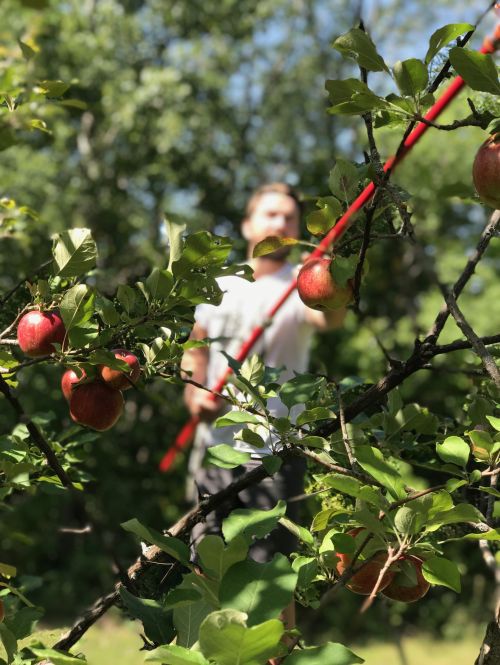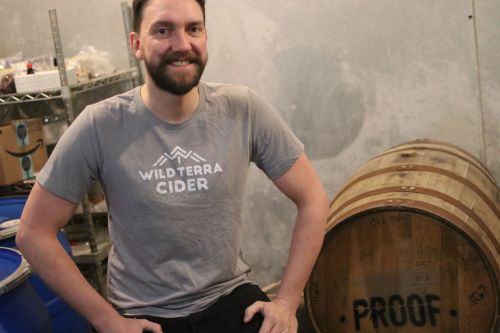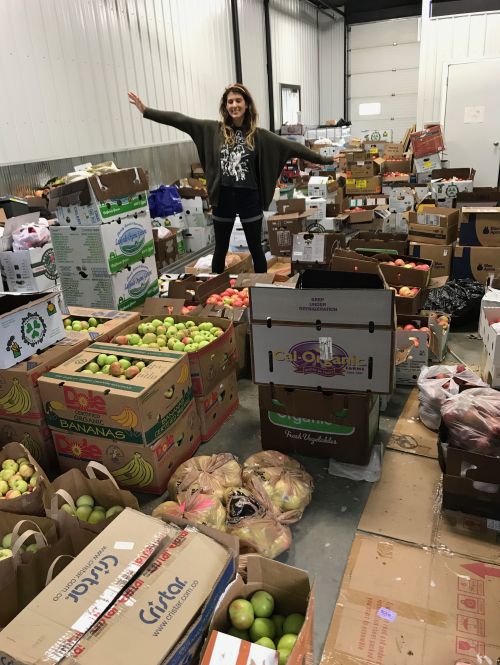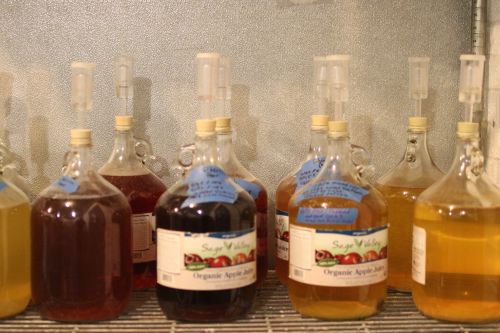News | April 24th, 2019

FARGO – When apple supplies were low last year, Ethan Hennings called out for help. Hundreds, from Moorhead to Bismarck, answered.
Sweet Honeycrisps and tart Northern Lights came in by the bushel. SnowSweets, Prairie Magics, and deep red Hazens followed Dakota Gold, an early ripening apple great for sauces and pies. Plucked primarily from trees planted in backyards, some tree owners exchanged the fruit for drinking vouchers at Wild TERRA, the city’s only “urban cidery.” Others let Hennings and his wife Breezee pick their apples for free, a time consuming and difficult task.
The Hennings and their newly established business weren’t asking for charity; they needed to know how many apples were available in the state. According to recently repealed turn-of-the-century North Dakota law, every winery and urban cidery fell under a majority clause, meaning a percentage of essential ingredients had to be sourced locally. Beginning in the second year, 10 percent had to be found locally, 30 percent in the fourth year, 40 percent in the fifth year, and 51 percent in subsequent years.
Without knowing where his apples would come from Hennings couldn’t predict costs, and he had no reliable supplier. Today, with only one cidery, he’s already begun distributing to Bismarck. He’s thinking about buying land and planting an apple orchard, but even then, the volume would not be enough.
In his second year of business, the amount of apples he was able to obtain in 2018 will fulfill only six percent of his needed volume for 2019, he said.
As the Sixty-sixth Legislative Session of North Dakota began, apple and grape lovers, even the wholesalers, joined together for a coordinated attack against what they called government overreach, and they won.
But not before threatening lawmakers with filing an initiated measure, Rod Ballinger, owner of Bear Creek Winery and elected leader of a coalition of nearly all the wine and cider makers across the state.
“If we hadn’t had filed that initiative, I don’t know if we would have made it,” Ballinger said. Ballinger was the former chairman of the Grape and Wine Committee and the state-appointed Grape and Wine Advisory Committee.
“They’ve been trying to change this bill for years,” Hennings said before the law was repealed. “Right now the laws are hurting the producers, hurting the growers, and hurting the industry. If we’re allowed to do what we want to do, our businesses and industry will grow.”
After twelve years – six legislative sessions – winery and cidery owners tried a tactic that never worked before. A retired grocery store owner and a Republican from Fessenden, Senator Jerry Klein, repeatedly stymied their efforts.
After being internally elected to represent 17 out of 18 wineries and cideries across the state, Ballinger asked the wholesalers for a sit down. They found common ground where there was none before, and beat tough legislative resistance primarily from Klein, and the North Dakota Agricultural Commissioner Doug Goehring.
Bob Nelson, president of Ed Phillips & Sons Co., a liquor distribution company, spoke through the North Dakota Wholesale Liquor Association lobbyist and attorney Pat Ward about the wholesaler’s discussions with the winery and cidery owners.
“We wouldn’t necessarily characterize this as a decade long struggle, rather an evolution of the domestic winery model and their needs,” Ward said in an email. “After spending time discussing the issues with members of the domestic winery group, we feel there is a better understanding of each industry’s position. This led to productive talks that allowed our support of HB 1190. We look forward to seeing North Dakota wineries and growers develop and succeed within the realistic model the Legislature has set up for them.
“We certainly want to see North Dakota based small business and entrepreneurship succeed. We represent several domestic wineries. The more successful they become, the sooner they will need a distributor to expand further. We believe that the Legislature originally saw this as value added agriculture and wanted to encourage the fruit to be grown in North Dakota for that reason. They had appropriated substantial funds in several sessions for grape research. We supported that sentiment as well.”

David vs. Goliath
“On the surface there were enough reasons to fight this law, but go into the shadows and it’s scary what the reasons are,” Mark Vining, owner of Rookery Rock Winery in Wheatland said.
Exemptions to current laws were available, but Hennings said the permission slips were nearly impossible to obtain.
“I don’t have proof, but it sure felt like corruption,” Hennings said. “We are the only industry that I know that had restrictions where we got our product from.
“Why were you stomping on us?”
“Our argument has always been ‘We have to survive,’” Vining said. “If state legislature is going to use funding by the state for research for the justification for the majority clause, then they should also make it equitable with the distributors, the bakeries, the flour mills… all those crops that were developed at NDSU with state money. So if they’re going to say: ‘We’re going to make you use the majority of products from North Dakota,’ they should use that same argument for all the other producers in the state.”
For years, wine and cider lovers couldn’t understand why their industries were being suppressed while similar industries were given free roam. Not only did the law stipulate that wineries had to purchase much of their produce locally, but they could only have 20 tastings per year.
Multiple attempts were made to contact Klein, but he did not reply.
Among Klein’s largest campaign donors in 2016 and 2012 was the North Dakota Beer Wholesalers State PAC with $1,000 each election cycle, according to the North Dakota Secretary of State. Klein received more than the North Dakota State Republican Caucus, which was given $500, the North Dakota Senate Democratic-NPL Caucus, which received $245, and the Republican House Caucus, which received a total of $645.
In 2012, the North Dakota Senate Democratic-NPL Caucus received $250 from the North Dakota Beer Wholesalers State PAC, the North Dakota Senate Republican Caucus received $500, and the Republican House Caucus received $645, according to the North Dakota Secretary of State.
The North Dakota Senate Republican Caucus – supported by the beer wholesalers PAC – also donated $500 to Klein in 2016.
Doug Goehring, the ag commissioner, said he supported Klein’s bill because he had to consider all the players involved, from the winemakers to the vineyards to the wholesalers.
“I am supportive of the wineries, but I’m also supportive of the vineyards and sometimes people have made this wineries vs. vineyards,” Goehring said. “I think there are some concerns there about bypassing vineyards and going directly out of state to buy juice, or wine, or produce.”
Setting majority clause variances wasn’t government overreach, Goehring said. Wineries and cideries were given special permits, 20 of them originally, where they could setup wine tastings without having to apply for a license.
“It wasn’t overreach, it was a waiver to operate without the government’s interference,” Goehring said. “The reality is alcohol is very well regulated across the country. When this was put together the only reason that the clause was in there about the percentage of production that had to be used out of North Dakota was to support the vineyards, the value-added agriculture part of it. A vineyard can generate as much as $7,500 in revenue an acre, and there is no farm that can do that.”
If produce could not be sourced locally, a winemaker or cider maker had only to pick up the phone and call him, or email him, or fax him for a waiver, Goehring said.
“Now, they’ve done away with the majority clause and they’re still granting the permits,” Goehring said. “I hope down the road as people have this discussion they don’t see it as overreach or trying to keep them down, the reality is it is a highly regulated industry that the legislature gave a lot of freedom to. Otherwise, they’re like anybody else.”
Jeff Peterson, owner of the state’s first winery, Pointe of View Winery in Burlington, said the situation for the past 16 years resembled David vs. Goliath, with a few legislators protecting big business or the wholesalers.
“Our industry for the last 16 probably years has been down in Bismarck active trying to incrementally improve our Century Code to make it more business friendly and more conducive to growth,” Peterson said before the bill was passed. “That’s why we are down there right now trying to get rid of this majority clause, if we don’t get rid of this majority clause our industry will fail.
“It’s almost like a control thing,” Peterson said. “We got what 760,000 people in this state? They could make a case for that [majority clause] in California where there is 38 million people, but in North Dakota there is only so much market.
“I know a lot of people who would like to open a winery, but they look at the laws and say ‘How can I do this?’”
Now that the law has changed, winery and cidery owners will be able to create more specialty product. Annual limitations to tastings have increased by 100 percent, allowing 40 per year. Once their supply lines have stabilized and production has increased, the market will follow the demand, Vining said.
“We prefer to buy everything we can buy as local as possible, it’s local, it’s cold hardy, it’s part of our marketing, so we don’t believe we need to have a state dictating to us whether we have to buy on the west or the east side of the Red River,” Vining said. “This is a huge win. It’s a win for the growers because it will allow the wineries to grow and create opportunities for local growers to plant and sell their produce to.”

The three-tier system and state legal history
The old law looked good on paper; after all, what’s better than a North Dakotan product, made in North Dakota, sourced in North Dakota? When the state has few apple orchards, however, and they’re all producing apples for their own ciders and products, fulfilling the legal requirements was impossible, Rod Ballinger, a former Delta Airline pilot, said.
“It was a battle,” Ballinger said. “We will always buy raw materials, grapes, or fruit here if we can. We were 200,000 pounds short last year. By opening this up it will allow wineries to sustain and grow and as we grow there will be a larger demand for fruit.”
Nearly all the wineries and cideries across the state joined together for House Bill 1190 to defeat Klein’s counter bill, one that backed the wholesalers, Senate Bill 2284. At first, victory wasn’t assured. After winning a large majority in the House, the bill narrowly failed in the Senate. After a second chance the bill was passed 25 to 21 in the Senate, and went to Governor Doug Burgum’s desk for signing.
The new law erases the majority clause variance, and will legalize purchasing any fruit when needed, from any legitimate source. By increasing the demand for apples Ethan Hennings hopes farmers may realize that the fruit is not just a tasty crop meant for homemade apple pies, but a lucrative business.
“It will help us make volumes go up,” Hennings said. “Initially it will come from other states, but after it will be more cost effective to gather locally.”
Like barley farmers in Montana, who because of rising microbrewery demand became the nation’s top barley producer in 2017.
The state’s model follows the U.S. Supreme Courts three-tier system of: manufactures make a wine or spirit, a distributor distributes, and a retailer sells, Representative Dan Ruby said. Ruby is, a Republican who introduced changes to the law in HB 1190. After Prohibition ended in 1933, alcohol distribution in the United States is closely regulated and adds heavy costs to the consumer. Some argue that current policy is antiquated, reflecting Prohibition-era mindsets, others argue that the system serves to combat alcohol abuse.
Either way, the three-tier system forces markups at each level, and for a country built on capitalism and free trade the practice to many seems like government overreach.
A bottle of wine that costs a winery $5 will sell for $10 to a distributor, and $15 to a retailer, according to analysts. At the table, one glass of wine sold to the customer typically pays for the establishment’s purchase price of the entire bottle.
“Look at the ag commissioner’s office,” Jeff Peterson said before the law was changed. “He’s truly Republican and in the past he’s reached out to people about a free market and less regulation, and yet he got up against us on Friday. He got up in support of 2284, and said we can just add a little more government control and if they need an exemption I’ll just give it to them under certain conditions. We were like, ‘Wait a minute, why do we need more government control in day-to-day operations?’
“I’d like to ask Doug [Goehring]… why does he want to be involved in my family’s day-to-day operations, my farming business? Rather than staying neutral and staying out of it, he took support of the 2284 bill. It’s all part of that small web that we have to contend with.”
In 2001, a winery or urban cidery – if one had existed – in North Dakota had to grow and produce all needed grapes, or apples, on property. In 2003 the law was changed after manufacturers were bringing in local honey and rhubarb among other ingredients as substitutes for needed products. The law was changed then to enforce a flat 51 percent of all ingredients needed to be grown in North Dakota.
A few years later state legislators changed the law again offering a graduated increase.
Both during the 2016 and 2019 legislative session, Dan Ruby introduced bills eliminating the mandatory percentage, and passed in the House of Representatives overwhelmingly, he said. In 2016, however, Senator Jerry Klein killed his bill in the Senate.
“We passed it out of the House overwhelmingly, and Jerry Klein changed it because it went to the IBL Committee which he chairs,” Ruby said before the law was changed. “He made it so ugly it took away some of the things that they get to enjoy now, some of the provisions in the law that allows them to operate in a way that they’ve been doing for a long time. They actually said ‘Oh, oh, kill the bill, kill the bill,’ and he was happy to oblige because that is what he wanted to do. So now, he’s put in a bill to do the exactly same thing. I don’t think it’s very appropriate for him to do that.
“Jerry Klein’s bill is bad,” Ruby said. “Rise and tide floats all boats, and the more they produce the more they will need distributors. And if we say you can’t bring juice or wine in that means the wineries won’t be able to send any wine or juice out.”
Some distributors don’t want the laws changed because they say large retailers such as Wal-Mart and Gallo will step in and take advantage.
“Whether it’s big against little, it depends on what side you are looking at,” Ruby said. “The distributors claim they’re worried about bigger retail companies. They’re really trying to protect the three-tier system of the manufacturer makes it, the distributor distributes it, and retailer sells it. ”
Differing from breweries, wineries and cideries are allowed to sell their products directly to retail, Ruby said, but most establishments use distributors.
“They do enjoy the privilege of being able to go directly to the consumer as the manufacturer, and that is what they seem to be the most afraid of, because distributors are afraid of large retailers doing the same thing.”

Experimentation
Approximately 12,000 new grape varieties await inspection at an experimental station in Minot. From those thousands of baby grapes, produced by “marrying” or combining a male Malbec or Merlot with a female North Dakota wild river grape, five, or hopefully six varieties will bear strong fruit, “a child, if you will,” Rod Ballinger said.
What grape and apple growers are looking for are hearty, cold-resistant varieties that will flourish in the frozen north. The goal is not impossible, in fact, it’s already working, Ballinger said.
Doug Goehring sampled a North Dakota wine not long ago. The grape was the product of six years of research at NDSU, a program supported originally with $65,000 from the state legislature.
“Probably by 2020 or 2021 we are going to have a new commercial variety released and patented in North Dakota for grape growers, and they will do that in like eight years,” Goehring said. “In the rest of agriculture you never get anything that timely.”
“That is off the charts amazing. It’s unheard of.”
The wine Goehring tasted has no name yet, but it was a smooth, nicely balanced red wine, like a blended Merlot or Cabernet.
An orchard came first for the owners of the Cottonwood Cider House in Ayr, and the cidery came next. With a 100-year farming history Stacy Nelson-Heising and her husband Daniel created the state’s first cidery. The decision to switch to apples was easy, making sure an apple orchard stays healthy and is productive is difficult, Nelson-Heising said.
Nelson-Heising takes care of the 2,000-tree orchard; her husband manages the cidery, she said. When her father retired and sold off the farm machinery she wanted to keep the Century Farm going.
“I thought, ‘what can a female do here to farm?’” Nelson-Heising said. “An apple orchard is interesting and not something you see on a regular basis and I was interested in doing it.”
Not all apple varieties can grow in North Dakota. Farmers must protect against destructive prairie winds, but so far do not need to worry about pests that orchards to the south must defend against. Soil and climate are two factors that give apples in North Dakota a distinctive flavor, and it’s her family’s job to find the perfect flavor.
“That is a big part of our identity, we think North Dakota can grow a really great apple,” Nelson-Heising said. “Really make a nice cider a flavor you cannot taste anywhere else.”
Five days after the majority clause rule was repealed, Ballinger talked excitedly about the endless possibilities orchard growers now have to experiment. Experimentation was already underway, but now private companies can flex their mental prowess.
“We’re no longer constrained by state boundaries to find other fruits, berries and grapes that we can either produce or blend in with our existing produce,” Ballinger said.
Grapes and some apples must be bred to survive temperatures down to minus 40 degrees Fahrenheit, Ballinger said. Two grape breeds already exist: Crimson Pearl and Petite Pearl, both dry reds. The marriage produced a new variety that will be able to withstand extreme cold, Ballinger said.
For now, Ballinger, who grew up on a farm in Verona, will be getting back to work and will also be involved in grape-naming ceremonies once successful varieties are discovered.
The fight for a level playing field was long and tedious, but for the grape and wine industry – not to exclude other local products such as rhubarb and yellow chokecherries – the sky, as long as rain doesn’t flood North Dakota’s vineyards, is the limit.
“We both got our what we want to protect our own industry,” Ballinger said. “When I went to the wholesalers they had concerns and we addressed those concerns. They worked hard at it too. They didn’t want a contentious legislative process.
“It did end up really well; everyone gained from it.”
July 7th 2025
June 9th 2025
April 30th 2025
April 24th 2025
April 23rd 2025

__293px-wide.jpg)



